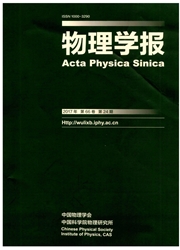

 中文摘要:
中文摘要:
本文研究了在真空、空气和氧气中烧结制备的三种CaCu3Ti4O12陶瓷材料的介电特性.交流阻抗测量结果表明在10-300K温度范围,三种样品的介电温谱中均出现三个平台,其电阻实部和电容虚部在相应温度出现损耗峰,真空条件烧结的样品具有较高的介电平台和较明显的电阻实部与电容虚部峰值,表明氧含量和氧空位对CaCu3Ti4O12的介电性质具有重要影响,介电温谱出现的三个平台分别源于晶粒、晶界及氧空位陷阱.温谱分析表明晶粒的激活能与烧结气氛有较大关系,氧空位引起的电子短程跳跃及跳跃产生的极化子是晶粒电导和电容的主要起源.氧空位陷阱的激活能基本与烧结气氛无关,约为0.46eV.氧空位对载流子的陷阱作用是CaCu3Ti4O12低频高介电常数的重要起源.
 英文摘要:
英文摘要:
Dielectric properties of three different CaCu3Ti4O12 ceramic samples sintered, respectively, in vacuum, air and oxygen are investigated. Three plateaus are detected in the dielectric temperature spectra within 10-300 K for all the three samples, meanwhile the three corresponding peaks of the real impedance and imaginary capacitance occur at a certain temperature. However, the sample sintered in vacuum presents a higher dielectric and clearer real impedance and imaginary capacitance peak, which indicates that oxygen concentration and oxygen vacancy have a great influence on the dielectric property of CaCu3Ti4O12. The results reveal that the three plateaus observed in the dielectric temperature spectra come from the grain, grain boundary and the oxygen vacancy sitting in grain boundary, respectively. The analysis of dielectric spectra indicates that the activation energy of the grain is related to the sintering atmosphere and the oxygen vacancy results in a variable-range-hopping conductivity and polarization for the grain. The activation energy of oxygen vacancy trapper is about 0.46 eV and is nearly independent of sintering atmosphere. The high dielectric constant at low-frequency or high temperature is caused by oxygen vacancy trapping carriers in CaCu3Ti4O12.
 同期刊论文项目
同期刊论文项目
 同项目期刊论文
同项目期刊论文
 Electron Paramagnetic Resonance Probed Defects in the Colossal Dielectric Constant Perovskite CaCu3T
Electron Paramagnetic Resonance Probed Defects in the Colossal Dielectric Constant Perovskite CaCu3T Effect of post-annealing on the phase transitions and magnetocaloric properties in bulk Ni44Mn45Sn11
Effect of post-annealing on the phase transitions and magnetocaloric properties in bulk Ni44Mn45Sn11 Influence of oxygen vacancy on the electronic structrue of CaCu3Ti4O12 and its deep-level vacancy tr
Influence of oxygen vacancy on the electronic structrue of CaCu3Ti4O12 and its deep-level vacancy tr Effect of alloying element Al substitution on Ni-Mn-Sn shape memory alloy by first-principle calcula
Effect of alloying element Al substitution on Ni-Mn-Sn shape memory alloy by first-principle calcula Alternating-Current Transport Properties of the Interface between Nd0.7Sr0.3MnO3 Ceramic and a Ag El
Alternating-Current Transport Properties of the Interface between Nd0.7Sr0.3MnO3 Ceramic and a Ag El Electroresistive and magnetoresistive properties of Nd0.7Sr0.3MnO3 after quenching under pressure of
Electroresistive and magnetoresistive properties of Nd0.7Sr0.3MnO3 after quenching under pressure of Microstructure and dielectric properties of Ca1-3/2xBixCu3Ti4O12 (x=0, 0.05, 0.10, 0.15 and 0.20) ce
Microstructure and dielectric properties of Ca1-3/2xBixCu3Ti4O12 (x=0, 0.05, 0.10, 0.15 and 0.20) ce Comparison bwtween intrinsic and interfacial electrical pulse induced resistance effects in La0.5Ca0
Comparison bwtween intrinsic and interfacial electrical pulse induced resistance effects in La0.5Ca0 Tunable dielectric behaviors of magnetic field of PZT5/NiFe2O4 ceramic particle magnetoelectric comp
Tunable dielectric behaviors of magnetic field of PZT5/NiFe2O4 ceramic particle magnetoelectric comp Tuning exchange bias through zero field cooling from different remanent states above blocking temper
Tuning exchange bias through zero field cooling from different remanent states above blocking temper Effect of thermal cycle on the interfacial antiferromagnetic spin configuration and exchange bias in
Effect of thermal cycle on the interfacial antiferromagnetic spin configuration and exchange bias in 期刊信息
期刊信息
